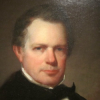William Gilmore Simms

William Gilmore Simms
William Gilmore Simmswas a poet, novelist and historian from the American South. His writings achieved great prominence during the 19th century, with Edgar Allan Poe pronouncing him the best novelist America had ever produced. He is still known among literary scholars as a major force in antebellum Southern literature. He is also remembered for his strong support of slavery and for his opposition to Uncle Tom's Cabin, in response to which he wrote reviews and a pro-slavery novel...
NationalityAmerican
ProfessionNovelist
CountryUnited States of America
William Gilmore Simms quotes about
The only true source of politeness is consideration.
Our possessions are wholly in our performances. He owns nothing to whom the world owes nothing.
We must calculate not on the weather, nor on fortune, but upon God and ourselves. He may fail us in the gratification of our wishes, but never in the encounter with our exigencies.
I know not that there is anything in nature more soothing to the mind than the contemplation of the moon, sailing, like some planetary bark, amidst a sea of bright azure. The subject is certainly hackneyed; the moon has been sung by poet and poetaster. Is there any marvel that it should be so?
Most men remember obligations, but not often to be grateful; the proud are made sour by the remembrance and the vain silent.
Neither praise nor blame is the object of true criticism. Justly to discriminate, firmly to establish, wisely to prescribe and honestly to award - these are the true aims and duties of criticism.
Solitude bears the same relation to the mind that sleep does to the body. It affords it the necessary opportunities for repose and recovery.
There is a native baseness in the ambition which seeks beyond its desert, that never shows more conspicuously than when, no matter how, it temporarily gains its object.
To feel oppressed by obligation is only to prove that we are incapable of a proper sentiment of gratitude. To receive favors from the unworthy is simply to admit that our selfishness is superior to our pride. Most men remember obligations, but not often to be grateful for them. The proud are made sour by the remembrance and the vain silent.